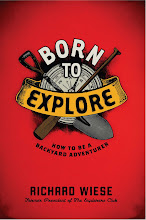
What makes an expedition memorable is not the primary mission but the people you meet along the way.

When you asked me if I'd spent any time with indigenous, native or primitive people my head started spinning thinking about all the years of travel and the dozens and dozens of expeditions I have participated in.

When you asked me if I'd spent any time with indigenous, native or primitive people my head started spinning thinking about all the years of travel and the dozens and dozens of expeditions I have participated in.

One of the intense pleasures of my travels has been the unique opportunities that I have had to live amongst those whose lives at first glance were so much different than mine. It is privilege every time I get the chance to peer into the world of native people as they are living looking glasses into our cultural past. I like to think of them as those who have not forgotten the old ways. Their deep set beliefs, ethics and customs unify and strengthen their families and communities and engender a genuine curiosity and hospitality toward visitors.

Most recently while filming with the BBC One and Discovery Science I lived and traveled with the Afar people of Ethiopia. They are an interesting group as they struggle to hold onto their old ways amidst a modern world closing in on them. You may know their name as they are a tribe notorious for castrating their enemies – I tried to view this reputation as core to some of their values. e.g. revenge, respect and honor. With that in mind, in the month I spent with them, I learned many lessons of manners and etiquette far quicker than I would have in any posh English Boarding school.

It is sometimes difficult to distinguish native, indigenous and primitive people as most groups have a combination of all three. My experience of these people scans the world and their open disposition and customs continue to inspire me. I have lived and traveled with many Chagga and Massai people of East Africa, several of which are now my friends (in fact I will be spending part of January 2009 with a good Chagga friend).
More than once, I trekked the deserts and drank tea with nomadic Berber and Bedouin in Morocco.
I have learned to be ingenuous with ice from the Eskimo of Alaska and the Inuit of Canada. While tagging Jaguars in Mexico I navigated the jungle with ancestors of the Mayan and Aztec. With native Shongaans as my guides, I have tracked wildlife and observed the intricacies of the ecosystem in the Kruger National Park in South Africa. I have chewed on coca leaves and shared stories with the Quechua and Aymara Indian tribes in the Colca Canyon of Peru. I gathered Yak dung for a stove with the Nepalese Sherpa’s. I foraged for food and spoke of the Rainbow Serpent with the aborigine of Australia.
In the 21st century we live in a world of vanishing cultures and as explorers it is our inherent duty to understand, share and sometimes preserve their traditions. We share with these cultures a passion for story telling, team work and camaraderie - and as such we keep their worlds alive. . I have often thought about this tradition and I usually envision one person standing over a fire to a spellbound audience telling a tale of lands far away. No matter what the language is it is generally started with the first sentence “you'll never guess what happened to me “or “you’ll never believe what's on the other side of that hill.”
In the 21st century we live in a world of vanishing cultures and as explorers it is our inherent duty to understand, share and sometimes preserve their traditions. We share with these cultures a passion for story telling, team work and camaraderie - and as such we keep their worlds alive. . I have often thought about this tradition and I usually envision one person standing over a fire to a spellbound audience telling a tale of lands far away. No matter what the language is it is generally started with the first sentence “you'll never guess what happened to me “or “you’ll never believe what's on the other side of that hill.”
These are times when people are becoming more aware of the need to promote and preserve indigenous cultures of specific localities and communities. Although we may look at these past cultures as primitive - or in the case of head hunters barbaric,a wisdom for mental wellbeing and a code to live one’s life by sometimes surfaces from apparently unlikely sources.




No comments:
Post a Comment